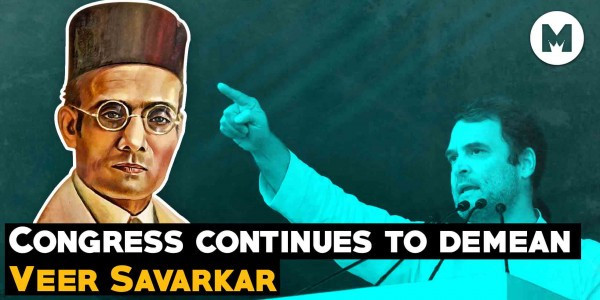
Article
Congress Seva Dal’s article on Veer Savarkar sparks fresh row
24 Sep 2020

Veer Savarkar has remained a controversial figure in Indian politics. Vinayak Damodar Savarkar or more commonly known as Veer Savarkar was an Indian independence activist, lawyer, politician and a writer who formulated the Hindutva philosophy.
Last month, Rahul Gandhi while taking a jibe at Veer Savarkar, refused to apologize for his ‘Rape in India’ remark, where he stated that he is not Savarkar to apologize for something which is right. It was after this that attempts to vilify Savarkar intensified and the critics went to an extent so as to call his clemency petitions as ‘apology letters.’
Also read: NPR row: Did Arundhati Roy make an irresponsible statement
In reality, nowhere did Savarkar ‘apologize’ in the clemency petitions that he wrote. After reading the petitions, would one realize that there is not so much as a “sorry” in the petitions. This can be corroborated by the note, dated November 23, 1913, written by Home Member Sir Reginald Craddock to Governor-General. An excerpt from the note reads:
Savarkar’s petition is one for mercy. He cannot be said to express any regret or repentance, but he affects to have changed his views, urging that the hopeless condition of Indians in 1906-1907 was his excuse for entering upon a conspiracy.
Savarkar showed no repentance but instead argued that his views had changed and that he would renounce the revolutionary activism and adopt peaceful methods if he were to be released. Revolutionaries and political prisoners, like Nand Gopal, Barindra Ghosh (brother of Aurobindo), Sachindranath Sanyal, etc, wrote similar petitions. In fact, Sachin Sanyal was released after he submitted his petition, but Savarkar was not. Sanyal wrote about it in his memoir:
“Why was Vinayak Damodar Savarkar not released but I was, although I wrote almost the same petition as him?”
Now, Savarkar’s promise of “loyalty to the English government” in the petition might raise a few eyebrows. Firstly, it was common for revolutionaries to make such promises. Secondly, it ought to be mentioned that the British government too was aware that the revolutionaries didn’t keep this promise of loyalty to the government after their release.
Also read: CAA Stir, How Citizens are resisting the controversial act
Lastly, the most common argument of the critics is that Savarkar wrote mercy petitions to save his life while other revolutionaries chose not to. This is absolutely false. There are innumerable examples of different revolutionaries convicted in different cases who submitted petitions. Writing petitions was a norm, a legal option, and Savarkar was neither the first nor the last to make use of that option.
The contemporary accounts and the government reports are enough to give the lie to the myth that Savarkar “apologized” and turned a “British stooge” in exchange for his release. Similarly, contrary to the belief that he propagated the two-nation theory, records show that Veer Savarkar, indeed, opposed the creation of Pakistan or a nation within a nation on the basis of religion.
Also read: Constitution and Democracy! Are we really following the boundaries
Savarkar was the first political leader to daringly set Independence as India’s goal in 1900, which was accepted much later by the Congress in its Lahore session in 1929. He worked relentlessly on abolishing the caste system. One must also not forget, that once Indira Gandhi, herself called Savarkar, the ‘Byword of patriotism and courage.’
However, the Congress Party, its president Rahul Gandhi and others of the ‘secularist’ school of thought have repeatedly insulted the great revolutionary and freedom fighter Swatantryaveer Savarkar. Time and again the Congress party and few like A G Noorani, have tried to hold Savarkar guilty in the murder of Mahatma Gandhi despite the fact that Savarkar was acquitted "honourably and without blemish" on February 10, 1949. Last year, Rajasthan Congress government removed "veer" from references to VD Savarkar from its textbooks.
In the latest development, the All India Congress Seva Dal stirred controversy with a booklet in which it claimed that the freedom fighter and Hindu Mahasabha co-founder Vinayak Damodar Savarkar was in a “homosexual relationship” with sage Mahatma Gandhi’s assassin Nathuram Godse. The Hindi book, titled “Veer Savarkar, Kitne ‘Veer’?” (How brave was `Veer’ Savarkar?) was distributed at an ongoing camp of the Seva Dal in Bhopal.
This has infuriated the BJP further, the party which had demanded Bharat Ratna for Hindutva ideologue in its election manifesto for Maharashtra Assembly election, held last year. The BJP has asked Shiv Sena’s stance on this issue. BJP Rajya Sabha MP Rakesh Sinha, was quoted as saying, "Shiv Sena must listen to Congress' views on Savarkar and decide if they should remain in such an alliance or not." Earlier, Shiv Sena MP Sanjay Raut in one of his tweets said that the name Savarkar denotes pride regarding nation and self. Raut further added that, Veer Savarkar is an idol of the whole country and not just Maharashtra.
Leave aside party lines, malicious attempts to malign the image of any freedom fighter, whether Veer Savarkar or someone else is utterly shameful for those involved in such acts and those who support them. Different ideologies co-exist in a diverse country such as India.
Badmouthing Veer Savarkar just because he shared a different ideology, displays a narrow mindset. It is sheer dishonesty on the part of our political figures, to paint a freedom fighter as a “British apologist”, only to suit their socio-political agenda. It is extremely important for the opposition leaders and especially Rahul Gandhi, to mull over, whether Indira Gandhi had once eulogized a ‘traitor’, ‘coward’ and a man complicit in Mahatma Gandhi’s murder.
Read More
कांग्रेस जिन्ना को आदर्श मानती है इसलिए सावरकर को गाली देती है- गिरिराज
राहुल के सावरकर वाले बयान पर विज ने कसा तंज
सावरकर: मायावती ने पूछा- अब भी शिवसेना के साथ क्यों कांग्रेस?










